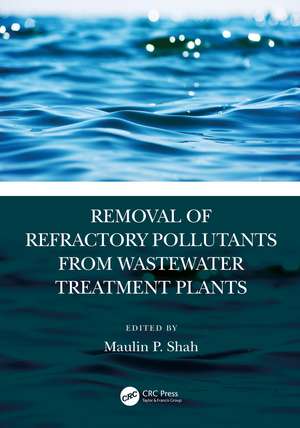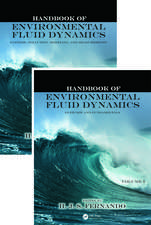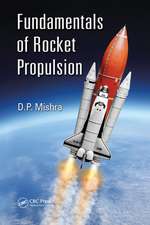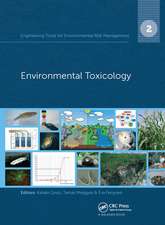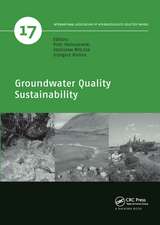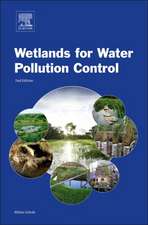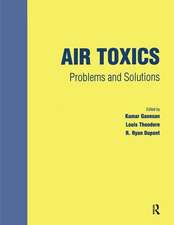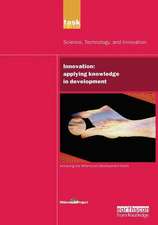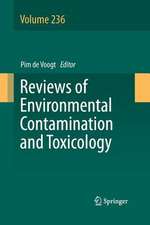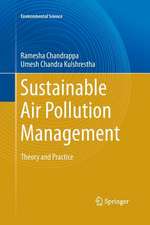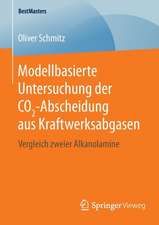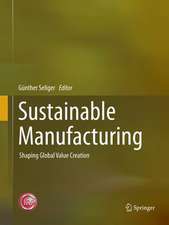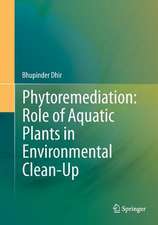Removal of Refractory Pollutants from Wastewater Treatment Plants
Editat de Maulin P. Shahen Limba Engleză Paperback – 26 aug 2024
Features:
- Examines the fate and occurrence of refractory pollutants in wastewater treatment plants (WWTPs) and the potential approaches for their removal.
- Highlights advanced remediation procedures involving various microbiological and biochemical processes.
- Assesses and compares the potential application of numerous existing treatment techniques and introduces new, emerging technologies.
Removal of Refractory Pollutants from Wastewater Treatment Plants is suitable for practicing engineers, researchers, water utility managers, and students who seek an excellent introduction and basic knowledge in the principles of environmental bioremediation technologies.
| Toate formatele și edițiile | Preț | Express |
|---|---|---|
| Paperback (1) | 459.26 lei 6-8 săpt. | |
| CRC Press – 26 aug 2024 | 459.26 lei 6-8 săpt. | |
| Hardback (1) | 809.58 lei 6-8 săpt. | |
| CRC Press – 8 oct 2021 | 809.58 lei 6-8 săpt. |
Preț: 459.26 lei
Nou
Puncte Express: 689
Preț estimativ în valută:
87.88€ • 91.76$ • 72.57£
87.88€ • 91.76$ • 72.57£
Carte tipărită la comandă
Livrare economică 15-29 aprilie
Preluare comenzi: 021 569.72.76
Specificații
ISBN-13: 9781032069081
ISBN-10: 1032069082
Pagini: 582
Ilustrații: 166
Dimensiuni: 178 x 254 x 30 mm
Greutate: 1 kg
Ediția:1
Editura: CRC Press
Colecția CRC Press
Locul publicării:Boca Raton, United States
ISBN-10: 1032069082
Pagini: 582
Ilustrații: 166
Dimensiuni: 178 x 254 x 30 mm
Greutate: 1 kg
Ediția:1
Editura: CRC Press
Colecția CRC Press
Locul publicării:Boca Raton, United States
Public țintă
Academic and Professional Practice & DevelopmentCuprins
- Removal of pharmaceuticals from wastewater using nanomaterials.
- Industrial wastewater treatment and reuse: Analysis and novel approaches.
- Prospects for exploiting microbes and plants for bioremediation of heavy metals.
- Application of UV/periodate advanced oxidation process for the degradation of persisting organic pollutants: Influence of water quality.
- Water Reuse and Recycling Systems: A Great Rejuvenation to Environment.
- Treatment of pharmaceutical compounds present in wastewaters using microbial fuel cells.
- Molecular Advances in bioremediation of hexavalent chromium from soil and wastewater.
- Fenton-like degradation of organic pollutants using rice husk-based catalysts.
- Activated Sludge Process for refractory pollutants removal.
- Microbial removal of toxic chromium for waste water treatment.
- Bioremediation of Cr (VI) contaminated soil using Bacteria.
- Phytoremediation for the treatment of various types of pollutants: A multi-dimensional approach.
- Recent technological advances for tannery wastewater treatment.
- Sustainable Bioremediation Strategies to Manage Environmental Pollutants.
- Viability of membrane separation technique in detoxification of recalcitrant pollutants.
- Treatment of emerging water pollutants by Fenton and modified Fenton processes.
- Advanced Technologies for Removal of Refractory Contaminants from Pulp and Paper Mill Wastewater.
- Challenges pertinent to phytoremediation: a future prospect.
- Membrane Based Technologies for removal of toxic pollutants.
- Microalgae-based Bioremediation of Refractory Pollutants in Wastewater.
- Photo-assisted Fenton degradation of organic contaminants under visible-light illumination.
- Microbial fuel cells for simultaneous wastewater treatment and energy generation: A comprehensive Review.
- Phytoremediation: An eco-friendly and sustainable approach for removal of toxic heavy metals.
- Biomembrane based technology for efficient removal of industrial effluents.
- Advances in photooxidation of nitro organic explosives present in aqueous phase.
- Cellulose based nanoadsorbents for waste water remediation.
- Application of green bioremediation technology for refractory and inorganic pollutants treatment.
- Role of enzymes in the bioremediation of refractory pollutants.
- Microalgae – A natural tool for water quality improvement.
Descriere
This book discusses new and innovative trends and techniques in the removal of toxic and or refractory pollutants through various environmental biotechnological processes from wastewater, both at the laboratory and industrial scale.
